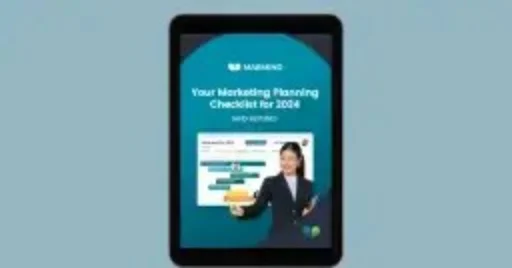Marketing automation is one of the most effective ways for businesses to optimize their marketing efforts. With a well-planned marketing automation strategy, you’ll be able to streamline tasks, improve efficiency, and easily track and measure outcomes – keeping your business competitive in today’s market.
In this guide, we’ll cover different types of automation processes, as well as the benefits and goals of marketing automation and the steps required to implement it effectively. Read on to find out more about what marketing automation can do for you.

What is Marketing Automation?
Marketing automation is the use of software platforms and technologies to automate repetitive marketing tasks – reducing, or removing, the need for human action. These tasks commonly include email marketing, lead generation, customer segmentation and personalization of advertising. Marketing automation software often includes the tools to handle many of these functions within a single platform.
Marketing Automation Processes
The term “marketing automation” covers a wide range of tools, platforms, and processes used to streamline marketing tasks. Let’s take a look at some of the most common types of automation being utilized by savvy marketing teams.
Social Media Marketing
Social media automation tools are used to schedule and manage posts across multiple social media platforms. They also offer features that enable you to track user engagement, automate responses and monitor brand mentions. These tools have the advantage of allowing businesses to maintain an active presence across various online platforms without the need for constant human attention.
Email Marketing
With email marketing remaining a cornerstone of digital marketing campaigns, using automation tools in this area provides an ideal solution for businesses looking to nurture leads and keep their customers engaged. Email automation platforms allow you to send welcome emails to new subscribers, set up drip campaigns, and trigger emails based on user behavior (e.g., abandoned cart reminders, product recommendations and post-purchase follow-ups) – ensuring your email marketing reaches customers in a targeted and personalized way.
Customer Relationship Management (CRM)
CRM automation tools can carry out marketing and sales functions such as audience segmentation, lead management and tracking of customer interactions. The data they provide helps businesses deliver more personalized marketing and sales experiences.
These technologies are able to identify and rank leads based on their behaviors and demographic information (lead scoring). Scores are assigned to leads based on actions that indicate engagement and interest, such as website visits, email opens and social media interactions. Once a lead reaches a certain score, they can be automatically passed on to the sales team for follow-up, enabling sales to prioritize hot leads and work more efficiently.
CRM automation tools can also nurture leads with tailored content, helping move them further down the sales funnel.
Advertising
Advertising automation helps businesses manage their advertising budgets, monitor the performance of their ad campaigns, and adjust bids based on key performance indicators (KPIs). Bidding strategies, scheduling, targeting and optimization can all be handled by advertising automation tools.
Analytics
Analytics software quickly processes large amounts of data to provide marketing teams with actionable insights about the performance of their campaigns. This enables them to make data-based decisions and optimize their marketing strategies, both in real time and over the longer term.
Why Use Marketing Automation?
There are many advantages to implementing marketing automation. Here, we’ll look at just a few of the ways an effective marketing automation plan can benefit your business.
Increased Efficiency
Setting up automated marketing workflows to handle manual, repetitive and time-consuming tasks will allow your team to spend more time on creative tasks, as well as decision-making, customer journey mapping, and developing their marketing strategy.
Improved Return on Investment (ROI)
A good marketing automation strategy will minimize your staffing spend by reducing the need for human action – for example, by running online marketing campaigns triggered by customer behaviors and identifying the hottest leads for your sales team to pursue. It will also increase customer lifetime value by automating practices such as up-selling, cross-selling and follow-ups.
Better Targeting and Accountability
Through the use of analytics, marketing automation platforms will allow you to refine your content and processes to target and nurture leads in more effective and personalized ways. Analytics also increase the accountability of your marketing and sales teams, providing clear metrics by which the success of their activities can be measured.
Marketing Automation Goals
When considering a marketing automation strategy for your business, it’s important to clearly define the outcomes you hope to achieve. In doing so, you’ll think about the processes required to reach those goals, and about which of these processes would benefit from automation.
Here are some of the main goals businesses aim for when implementing marketing automation:
Lead Generation and Conversion
Businesses look to convert prospects into paying customers with minimal manual intervention. The automation of lead capture, segmentation and nurturing processes facilitates this, ensuring that leads are handled effectively and the right messaging is delivered at the right time.
Increased Customer Retention and Loyalty
Marketing automation tools not only support businesses in acquiring new customers; they also play a significant role in retaining existing ones. Using automation workflows to send out offers, reminders and follow-up emails helps businesses keep their customers consistently engaged, building loyalty over time.
Personalization is key here, and tools such as CRM platforms allow businesses to deliver individualized messages and content to audiences, even at scale.
Better Analytics and Reporting
With the right marketing automation tools, businesses can track campaign performance, customer behavior and other key metrics. This data provides valuable insights into what’s working and what’s not, enabling marketing teams to optimize their strategies and make data-driven decisions.
How to Implement Marketing Automation
So, you’re chomping at the bit to get started with a brilliant marketing automation plan! How should you go about it? Here are the key steps involved in creating and implementing an effective marketing automation strategy for your business:
Define Your Objectives
Before selecting any marketing automation tools, define what you want to achieve. Are you focusing on lead generation, customer retention, or both? Do you need detailed analytics? Setting clear objectives will help you choose the right tools and ensure that your automation strategy aligns with your overall business goals.
You’ll also need to define what metrics you will use to evaluate the success of your marketing automation project plan. These must be specific, measurable, and relevant to your chosen marketing objectives.
Map Out Your Customer Journey
The next step is to create a customer journey map and identify trigger points where automated workflows could optimize the customer’s experience and encourage conversion. This will give you better insight into what types of marketing automation process will be most useful for your business, and what software functionalities you might benefit from.
Choose Marketing Automation Tools That Fit Your Needs
Once you’ve set your goals and mapped out your customer journey, you’ll be ready to look for a suitable marketing automation platform. Give careful consideration to which features and functionalities you’ll need – there are many platforms on the market, and you’ll want to find one that fits your budget as well as your business objectives. You may also want to give some thought to whether your chosen marketing automation software integrates with other tools you already use, and whether it is capable of scaling along with your business as you grow.
Segment Your Audience
Segmentation is an essential component of any marketing automation strategy. Creating audience segments based on factors such as demographics, interests and behaviors will ensure that your messaging is targeted to each group and resonates as intended, increasing engagement and conversion rates.
Produce Engaging Content
Marketing automation doesn’t negate the need for great content. Make sure you create valuable and engaging content for each stage of the customer journey, whether that means blog posts, ebooks, video content or newsletters. The more personalized and relevant your content, the better your results will be.
Create Automated Workflows
When you have your content ready, it’s time to set up your automated marketing campaigns. Your marketing automation plan could be based on a predetermined schedule and/or triggers such as user actions and behaviors, and could include welcome emails, a drip campaign, abandoned cart reminders, birthday discounts, or post-purchase follow-ups. Automating these processes allows you to maintain consistent communication with leads and customers – without the need for consistent oversight.
Track and Optimize Your Campaigns
Once your automated campaigns are up and running, you’ll need to continuously monitor their performance. Use analytics tools to track your chosen metrics, whether they include click-through rates, conversions, or other relevant KPIs. These insights will help you refine your campaigns, content and strategies for improved results.
Final Thoughts: Will Marketing Automation Benefit Your Business?
In a word – yes. Implementing marketing automation in the right ways can significantly enhance your marketing efforts, making efficiencies in multiple areas and boosting your ROI.
To create an effective marketing automation plan and experience successful outcomes, it’s important to carefully consider your customer journey and the needs of your business. This will enable you to choose a marketing automation platform that aligns with your goals and budget.
Marketing automation is a growing trend that we expect to continue in the coming years. For businesses aiming to remain competitive, now is a great time to get on board and learn the ins and outs of marketing automation tools.













